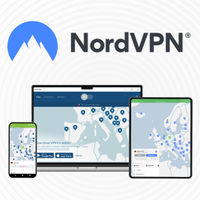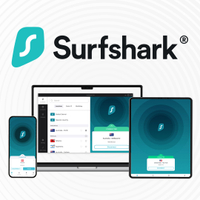Off to college? Here's why you need a VPN
Your best (digital) study buddy

As summertime winds down, and another academic year creeps closer, new and returning college students will be kicking off their preparations anytime now. If you've treated yourself to a shiny new laptop (or packing your old faithful machine), you'll want to invest in one of today's best VPNs.
Okay, you might wonder why – but VPNs are incredibly handy bits of tech that you can use just like any other app or program. They'll boost your online privacy, let you check out more academic resources, and help you get more from your Netflix subscription. Keep reading for all the details.
For work…
A VPN's main job is to enhance your digital privacy – which is handy, seeing as cyberattacks are happening more and more often. Your VPN will encrypt your web traffic, ensuring nosy third parties (like hackers) can’t take a peek at what you're doing, and even give you a shiny new IP address you can use to pretend you're somewhere else in the world.
Stay secure on public Wi-Fi
Encryption is important for students who'll be relying on public Wi-Fi hotspots – the ones offered for free by your college, or by cafes, hotels, airports, and other public places.
It's always nice to have access to these connection points (especially if you're trying to budget your mobile data) but they’re notoriously insecure.
Typically, free Wi-Fi lacks the same security measures as the internet you'd use at home, meaning any personal information you type out or submit while connected to the hotspot could be vulnerable to interception.
If you're interested in the details, head on over to our (jargon-free) guide to how a VPN works.
Then, there are the honeypot attacks – and they're not as cute as they sound. Someone intent on stealing your data could set up a fake Wi-Fi hotspot and name it something close to the original. So, if the real deal is called CampusWiFi, they might call theirs Campus_WiFi.
If you connect to one of these dodgy hotspots, you'll effectively be handing your data over to the cybercriminal who created it with a bow on top. This includes stuff like your login details, financial information, and personal data.
Access academic resources
Let's say you're working on a paper and you need to find a few scholarly articles to reference – but you get a pop-up stating that they're not available in your country. Instead of admitting defeat and beginning your search all over, you can simply switch on your VPN.
VPNs typically have servers dotted around the globe. Connect to one, and you'll get a new IP address based in the same location as the server, and it'll mask your original IP address, too.
This is what fools the sites you visit into thinking that you're in the same country as the server you chose.
So, to access geo-restricted news outlets or research data, simply open up your VPN, pick a server in a country where the resources you need are available, and hit that connect button.

…and play
Countless people rely on VPNs to keep the internet free and accessible. In countries where governments impose harsh internet restrictions, people turn to VPNs to unblock the likes of X and Facebook, stay connected to family, and access unbiased news outlets.
VPNs can access social media platforms your college has blocked
The same principle applies to bans enforced by college campuses. You might find that social media platforms are blocked by your establishment of choice. They do this to keep you focused on completing your degree rather than crafting the perfect X post.
However, if you'd rather not be cut off from the rest of the digital world, connecting to a VPN server will allow you to log in and continue scrolling, no big deal.
Stream more stuff
Okay, this is a big one. If you're subscribed to a streaming service, like Netflix, you probably know that different countries have different shows and movies available to watch. It's all thanks to licensing agreements that tell the platforms where they can and can't broadcast certain things.
Still, it's annoying if the show everyone is raving about just isn't available in your country.
Enter the VPN. Simply pick a server where the show is ready to watch, connect, and refresh your streaming app, and you'll be able to tune in.
How? Well, the streaming service sees that your IP address is based in the same country as the server you're connected to – and it'll serve up that nation's buffet of content as a result.
So, if you want to see what's new on US Netflix, pick a server in the States. If BBC iPlayer is more your thing, you'll want a server located in Britain.
Get the edge when gaming
VPNs know how to have fun, too, and come in handy for gamers who'll be taking their rigs or consoles to campus with them. If you have friends overseas you'd like to play with, you can connect to a VPN server in the same country, boot up the game, and you'll be placed in the same lobby.
Check out our gaming VPN rankings to see which services can take your gaming sessions to the next level.
Streamers, MMO players, and other online gamers will be glad to learn that VPNs can prevent DDoS attacks, too. The sore losers behind these attacks will attempt to identify a player's IP address and, annoyingly, flood their network with requests it just can’t handle.
However, because a VPN cloaks your original IP address and assigns you a new one, the bad actors won't be able to pick out your real network.
Oh, and for all your bargain hunters out there, you can use your VPN to do a bit of server hopping to find the best deals – on games, consoles, accessories, and more. Prices vary from country to country, so it's worth shopping around before you drop a scary amount of money on that newest AAA title.
NordVPN - from $3.19 per month
The best VPN for most people
NordVPN is TechRadar's reigning champ and an awesome all-rounder. You'll get apps for all your devices and easy-to-use security tools to keep your browsing sessions secure. NordVPN even has its very own built-in ad blocker. It's worth noting that NordVPN unblocks virtually every streaming service you can think of, even the smaller regional ones, and is more than quick enough to keep up with 4K movie marathons. Interested? Check it out for yourself with a 30-day money-back guarantee.
Surfshark - from $2.19 per month
The best cheap VPN
Surfshark is a budget-friendly choice and a favorite of students worldwide – proving that there's no need to pay a fortune for top-notch security. In return for a tiny subscription fee, you'll get user-friendly apps ideal for newbies, an ad blocker, and unlimited simultaneous connections you can share with friends… or your entire dorm, if you're feeling generous. Surfshark is seriously quick, too, which is great news for Netflix fans and gamers who don’t want to be slowed down by that dreaded buffering circle. Take Surfshark for a test drive with its 30-day money-back guarantee.
Disclaimer
We test and review VPN services in the context of legal recreational uses. For example: 1. Accessing a service from another country (subject to the terms and conditions of that service). 2. Protecting your online security and strengthening your online privacy when abroad. We do not support or condone the illegal or malicious use of VPN services. Consuming pirated content that is paid-for is neither endorsed nor approved by Future Publishing.

River is a Tech Software Editor and VPN expert, helping take care of cybersecurity content on TechRadar, ranging from reviews, buying guides, and must-have VPN deals. River's expertise in the cybersecurity field opened their eyes to the startling amount of online snooping we accept into our daily lives. Now, River is committed to fighting for your right to digital privacy by shining a light on its biggest threats – and helping readers safeguard their data with the help of a VPN. Surfshark is River's favorite VPN, and they use it every day to keep their most sensitive details out of the hands of third-party trackers.

